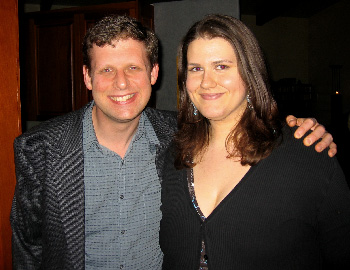We are developing the social individualist meta-context for the future. From the very serious to the extremely frivolous... lets see what is on the mind of the Samizdata people.
Samizdata, derived from Samizdat /n. - a system of clandestine publication of banned literature in the USSR [Russ.,= self-publishing house]
|
For an excellent overview of the Schiavo case, written by someone with a better work ethic than me (she links to her sources, I just kind of remember their gist), go to Majikthise.
Out of the morass of purely case-specific issues in this case, perhaps the most legitimate policy argument raised by the Schiavo trainwreck has to do with the withdrawal of food and water.
Let’s be clear on Schiavo’s condition and treatment here: she is being fed and hydrated through a tube in her stomach. She is not feeding herself, and is presumably not capable of taking food and water orally, or the tube would never have been inserted. This kind of feeding and hydration is just as much a medical treatment as having a glucose or saline IV inserted into your arm.
No one attempts to deny that Terri (or anyone else) would be permitted to refuse this treatment for themselves; a law mandating that you receive a given medical treatment against your will would be widely regarded as an abomination.
Similarly, no one seems to be seriously arguing that if Terri were on a ventilator or some other form of artificial “life support”, that her guardian should be permitted to withdraw the life support, even though there is no written evidence of what Terri’s wishes were in that regard.
This leaves many of the folks who are now arguing for federal intervention into Terri Schiavo’s medical treatment in the rather uncomfortable position admitting that (a) she could refuse to consent to being fed through a tube in her stomach, and (b) that her guardian could withdraw other forms of life support, but nonetheless that (c) her guardian cannot refuse consent to her being fed through a tube in her stomach.
Thus, the policy question being posed by this case seems to be whether a surrogate decisionmaker should be compelled by law to “consent” to their ward being fed through a tube in her stomach, unless he can produce written evidence that is what the patient would have wanted.
The case against such a legal mandate boils down to the argument that denying the right to consent or refuse consent to the surrogate is the same as denying it to the patient herself. Of course, the surrogate is not, in fact, the patient, and there may be legitimate boundaries placed on the decisions the guardian can make on behalf of their ward. The question is whether withdrawal of nutrition and hydration is outside of those boundaries, and if so why.
The case for a legal mandate that nutrition and hydration be given over the objections of the legal guardian rests comes down to the argument that, where there is any doubt as to what the patient would want, we should err on the side of keeping them alive. This argument, however, founders on a couple of points. Logically, it cannot be limited to nutrition and hydration, and thus requires that we keep all life support, no matter how extraordinary, in place. Further, it begs the question of how much certainty is enough. Even where a written living will exists, the question can be raised about whether the patient changed her mind.
Because we cold-hearted libertarians care about such things, Terri Schiavo’s care is being paid for by taxpayer money through the Medicaid program. Even though her parents have noisily pledged to take all financial responsibility for her care, they have not yet done so, even though the trust fund established out of the proceeds of her malpractice case to pay for her care is nearly exhausted. The annual cost is probably around $80,000 per year.
A few weeks ago parts of the libertarian intellectual scene marked what would have been Ayn Rand’s 100th birthday. Among a number of articles reflecting on her life and novels was this surprisingly conservative article by Reason magazine regular Cathy Young. Young is determined to present both Rand’s great virtues alongside her not-so agreeable side, particularly her intolerance of anyone, who, however constructively, criticised her.
But the article contains a number of charges about Rand and her system of ideas which I think are unfair. I want to address them not as some sort of defence of Rand – a writer who had some serious faults, in my view – but because the points Young makes can be applied to classical liberal/libertarian views more broadly.
Young claims that Rand had no time for family life of any kind and that her main characters appeared to have no enjoyable family life at all. As a result, her value system is held to be seriously deficient, in that Young claims that a viable human society requires us to feel obligations towards our fellow family members even though a person has not chosen the family he or she is in. (The same sort of argument is used by conservatives to justify loyalty to a country). This surely overlooks the point that for Rand, the relationships in life that matter are the ones people choose to enter into, not those born of historical accident. I am lucky enough to have been raised by two loving and smart parents. Very lucky, in fact. But it is obviously not so great for many other people and I have no doubt that a few of my friends and acquaintances have been drawn to libertarian ideas as a way of rebelling against the sort of unpleasant experiences that many children can have. So I certainly don’t condemn Rand because her heroes and heroines did not take out time from their adventures to change the kiddies’ diapers. After all, many great works of fiction contain characters with no reference to family issues at all. Young does not address it, but for Rand, and indeed many others, there can be no such thing as unconditional love. The sense of obligation I feel towards my parents cannot, in my view, be divorced from my sense of gratitude towards them. If they had been monsters, I would feel quite differently.
Another charge that Young makes is that Rand (and presumably many libertarians) had no interest in charity and therefore a society created by rational egoists would have no base of voluntary organisations able to help others in times of distress. That seems odd. As David Kelley points out in this marvellous book, “Unrugged Individualism”, rational self interested people have a direct vested interest in cultivating a benevolent, friendly disposition towards their fellow humans. In fact many people become firefighters, nurses, paramedic rescuers and the like precisely because it is an important value to them to do such things. In short, charity is not in conflict with enlightened self interest at all. What counts is that the actions concerned are voluntary rather than something that is imposed by coercive force.
Such drawbacks aside, Young’s piece is well worth reading. I discovered, for example, that Rand did not have much interest in evolution, which seems a bit strange for a declared atheist and enthusiast for science. I would have thought that evolution is something that fits quite snugly into a pro-reason, pro-freedom political phiolosphy, as Daniel Dennett has shown.
Harry Hutton mostly does sarky, misanthropic humour, so this on the spot reportage from Colombia might very well get missed by a lot of more earnest types than him who would appreciate reading it.
Here is John Pilger arguing that American military aid has caused a humanitarian disaster in Colombia. The trouble with this is that, since the really huge flows of US arms and money began, the level of violence has plunged.
Kidnapping fell 42% last year, and 26% the year before that; the number of massacres was down 53% in 2004, and murder fell 17.7%; street crime, the number of displaced persons, crime against taxi drivers… all down. And every single Colombian I have spoken to, without a single exception, has told me that the situation has improved. I had dinner with some foreign human rights workers, who told me that this was also their strong impression.
Harry’s commenters have mostly concentrated not on whether the above reportage is true, but rather about the rights and wrongs of legalising the drugs, the proceeds of which are so much a part of the problems of Colombia. Or maybe not, because Colombia has always been a violent place. I favour total drug legalisation for all the usual libertarian reasons, but whatever you think about that, this is an interesting piece of reportage.
A few other commenters have also pointed out what a lying twat Pilger is. It is good that such drivel as his can now be challenged quickly by bloggers who, unlike Pilger, actually know what Pilger is talking about. Had I come across it by some other route, I would have dismissed Pilger’s piece as almost certainly being made-up rubbish, purely because of who it is by, but it is nice to be sure.
The Economist (the link, alas, leads to their premium content) has an interesting little article about fake news – ‘news’ broadcasts put out by the government via local television networks. Bogus reporting (or, more kindly, a video equivalent of issuing a press release) they call it:
The televised interview with John Walters, the White House drug tsar, ran on hundreeds of local stations before the 2004 Super Bowl. “Many parents admit they’re still not taking the drug [marijuana] seriously,” explained the news anchor. “Mike Morris has more.” It ended with the usual sign-off: “This is Mke Morris reporting.” It looked like a new report, and quaked like a news report. but it was not one. The segment had been produced by Mr Walters’s Office of National Drug Control Policy. The apparently independent Mr Morris was on contract to the government.
As the Economist points out the government should not be in the business of advocacy, but it may use public money to provide information. The question is which is which? Regardless of the formality of the decision and which watchdog or arm of the administration has the final say about the legality of such “news management”, the issue here is transparency. Both the government agency and the news programmes should identify the originator of the material they are running.
The most interesting point of the article is not even that – it is highlighting that this administration does not think that the press has “a check-and-balance function” and that this is a fundamental change of attitude compared with previous administrations and makes this one’s use of fake news different.
If there is nothing special about the press, then there is nothing special about what it does. News can be anything – including dress-up government video footage. And anyone can provide it, including the White House, which through local networks, can become a news distributor in its own right. Given the proliferation of media outlets and the eroding of boundaries between news, comment and punditry, someone will use government provided information as news. In short, the traditional notion that the media play a special role in informing people is breaking down.
The conclusion is one that many bloggers have been trying to break to the traditional media and journalists.
Behind all this lies a shift in the balance of power in the new business. Power is moving away from old-fashioned networks and newspapers; it is swinging towards, on the one hand, smaller news providers (in the case of blogs, towards individuals) and, on the other, to the institutions of government, which have got into the business of providing news more or less directly. Eventually, perhaps, the new world of blogs will provide as much public scrutiny as newspapers and broadcasters once did.
For myself, I am not too worried about “covert propaganda” in government broadcasts provided there is an individual somewhere in the process who will simply blog about it on his blog…
Saturday night’s American Cinema Foundation panel at the American Film Institute in LA, moderated by media critic Cathy Seipp, was fascinating on several levels.
The theme of the event was “Mass market, smart content,” and featured four TV writers/producers/directors: Paul Feig (creator and executive producer: “Freaks & Geeks;” director: “Arrested Development;” director and writer, the feature film “I Am David;” author: “Kick Me: Adventures In Adolescence” and the upcoming “Superstud: How I Became a 24-Year-Old Virgin”), Scott Kaufer (executive producer: “Boston Legal;” writer: “Gilmore Girls,” “Chris Isaak Show,” “Murphy Brown”), Rob Long (co-creator and excecutive producer: “Men, Women & Dogs,” “Love & Money,” “George & Leo;” executive producer: “Cheers”) and Tim Minear (executive produer: “The Inside,” “Wonderfalls,” “Angel,” “Firefly”). Together, they tackled the issue of how successful television writers manage to keep their distinct viewpoints when writing for the mass market.
I believe wholeheartedly that there is no such thing as ‘the mainstream,’ and that the mass market is dead, and being replaced by a mass of niches. I also believe that the mass media is not being destroyed, merely altered radically, and individuals are being liberated from the mass by the unprecedented choice of personal relevance that (thanks to things like blogs, mp3s, TV on DVD, podcasting, and TiVo) they have today – and that choice of personal relevance is increasing exponentially at a rapid rate. So the topic of the panel was extremely appealing to me as a total geek on the social ramifications of emergent technology tip.
I guess I forgot that these guys write some funny stuff, and that they were going to make me laugh – which they did, in a big way. Some of my favourite exchanges and lines:
CATHY SEIPP: How do you react to people who say they never watch TV?
TIM MINEAR: I run them over with my Mercedes.
SCOTT KAUFER: After seeing [the movie] JFK, I thought, “Why don’t I make a movie called Oliver Stone, and just invent shit?
ROB LONG: What would you have to invent?!
PAUL FEIG: That he’s nice, he’s respectful of women…
TIM MINEAR (on not being allowed to have a serial killer character use the word retard): The network thought the serial killer was being awfully insensitive.
I did not want to hit the guys over the head with the beliefs I laid out above, so I asked them if they thought that TV series on DVD (which they all seemed to agree was the best thing to happen to TV in a long time, even if the lack of leadership in the Writers’ Guild means that they get screwed out of decent earnings, receiving only 2 or 4 pennies per DVD sale), TiVo, and that greater choice of personal relevance is going to affect what they do in any significant way. Every panel member had something to say about that, but the most interesting answer came from Paul Feig, who said that the bottom line is that the show that draws the most advertising revenue wins, and it will always be that way.
Except I am sure that it will not always be that way, and that the advances in emergent technologies and the rebirth of niche will bring about that dramatic shift a lot sooner than we may think. The business model of broadcast must change if it is not to die (and with only 12 per cent of US viewers getting their TV via antenna these days anyway, ripping it down is not a bad idea). As viewers (read: customers) get used to having that personal choice of relevance, they will throw their attention (read: value) to the places where they can get it: cable, satellite, and the internet. And if you think advertisers will not pick up on that and move their ad spend accordingly, I have some stock in broadcast that I would just love to sell you.
The kicker being, I do not believe that advertising revenue is going to be the bread and butter of TV on cable, satellite, and the internet. Sure, there will be ads in the world as long as there are lazy, clueless companies who believe in “just in case” marketing. But the costs of that kind of marketing are rising, the effectiveness declining, and profits down as a result.
Which brings us to my point: This drive to niche dovetails very nicely with the need of companies to put customers at the beginning of the value chain instead of at the end of it. The increasing emphasis on the individual also means a move from push marketing to engagement marketing. So instead of wasting a great deal of money on a TV ad, a company can spend a fraction of that on, say, developing great blogs to provide value and engage the niche they are targetting. (They can throw some podcasts up there while they are at it.)
So here is the question I really wish I had asked the panel: Ten years from now, who exactly is going to be spending the kind of money on network TV ads that they need to maintain this broken system? And if that money isn’t there, will you be running over non-TV-watching freaks with your Kia instead of your Mercedes?
I’m all for equality. I am. That’s why I let my female staff work longer than the men so they can earn the same.
– the Pub Landlord on telly last night
As has been mentioned, I am presently in southern China. At this precise moment, I am using WiFi in a Starbucks in central Shenzhen, just over the border from Hong Kong, recuperating from the heat and humidity outside, and taking an immense dose of caffeine to fight my jetlag.
The Pearl River delta is at this point in history the workshop of the world, particularly in terms of electronics manufacturing (although the goods with the high capital costs tend to still be made in Taiwan, Korea, and elsewhere). Much of the manufacturing tends these days to be done in places like Dongguang (a little further upstream) but Shenzhen is where you go if you want to buy the stuff.
I shall have a lot more to say on this (and lots and lots of photos) later. But for now, here is a picture of some graphics cards with really big fans that I took in a truly immense electronics market a few minutes ago.

This will no doubt make Perry happy.
At the moment, my fellow Samizdatista Michael Jennings is somewhere in South China. In fact, a few minutes ago, he crossed the border from the “Special Administrative Zone” in Hong Kong, and into the Shenzhen region(?) of China.
How do I know this? Well, he just sent me an SMS message saying so. Quite extraordinary that it is easy as pie to send a message from China to Australia in such a manner. Of course, it is amazing how blase one gets to modern technology. I have grown in the habit of sending him SMS messages to his phone when he’s in Europe, without thinking about it. Usually we send sports scores and commentaries to each other; as cricket coverage is thin on the ground in China, I’m keeping Michael up to date with the latest scores from the cricket Test in Wellington.
A curious thought- there’s a new “Star Wars” movie coming out soon, and I watched the trailer online last night. In the “Star Wars” universe, SMS has of course been rendered obsolete by holograms. It is all rather futuristic, but is it practical?
No doubt it is technically possible. One of the very bright engineers in the Samizdata.net readership might like to explain what it would require. But will it ever catch on? I am not so sure.
One technology that is here and now is video telephones, marketed here in Australia by 3 Mobile. A cousin of mine gave them a whirl, and I asked her how it went. She reported that it wasn’t as good as she thought; too often, she was not comfortable with her appearance or did not want to have her caller identify her exact location. Although she found the technology quite clever, she found it intrusive, and not as useful as she had hoped.
I think if a clever engineer ever developed a hologram means of communication such as we see in the “Star Wars” movies, they might be dismayed by the lack of interest shown in it.
I will tell you why. Like many bloggers, I blog in my pajamas, and I would shudder to think of letting anyone seeing me in such a state. Especially since, with today being Sunday, I’ve not the slightest of intention of dressing up. I can send SMS messages to South China and no one need know how badly dressed I am. This relatively simple method of communication will be with us for quite a while yet.
…no, not as in ‘Hollywood sucks’. Far from it in fact.
Our favourite lefty in Los Angeles, film producer, cigar addict, gun-owning pinko, O.G. blogger and all around gentleman Brian Linse kindly made his severely cool house in the Hollywood Hills available to me and fellow Samizdatista Jackie so that we would throw yet another blogger party for many very interesting people connected to the blogosphere…

Mickey Kaus demonstrated his improvised vampire repellent technique to a hushed audience

Many people stampeded into the bedroom when Amy suggested a game of ‘spin the bottle’

Eugene Volokh gave Jackie some legal advice in return for the famous Chilli Con Chelsea recipe

Arianna was described as a ‘once and future blogger’ but she seemed pretty blog-savvy right now Update: More reports and pictute of the latest LA Blogger Bash can be found here, here, here, here, here and here.
I always thought that NGO meant Non Governmental Organisation. How come any of them get money from the state?
– thanks to Natalie Solent for spotting a good point made at The Road to Euro Serfdom
Armageddon: The Battle for Germany, 1944-1945
Max Hastings
Knopf, 2004
I do not suppose that at any moment of history has the agony of the world been so great or widespread. Tonight the sun goes down on more suffering then ever before in the world.
Sir Winston Churchill’s bleak view, given to his daughter at the Yalta conference, reflects the deplorable state of Europe in February 1945. The end of the war in Europe was now clearly in sight; however, the finale promised, and delivered, horrors of a truely grotesque nature.
The nature of the German collapse was such that it has not received a great deal of attention by historians. Once the Allies were fully established on the Continent with their victory in the Battle of Normandy, the nature of the outcome of the war was set, and apart from Operation Market Garden, the Battle of the Bulge, and the Battle of Berlin, not a great deal of attention has been given to the general course of operations in Europe.
That is not so surprising. The collapse of Germany was in the most part a gradual erosion rather then a swift cracking. The German army had been broken in France, but logisitical problems and the weather had halted the Allies progress; given time, the Germans were able to scramble enough forces to halt the Allies advance; even launch one last desperate counterattack.
The erosion and collapse of German military power forms the basis of this book, but it is much more then that.
→ Continue reading: Europe’s final agonies.
The American diplomat George Kennan passed away on Thursday night, at the ripe old age of 101.
George Kennan was famous for being the principle intellectual architect of the US policy of ‘containment’, as applied to the USSR. As a diplomat who served in the USSR, he composed what is known as the ‘Long Telegram’, which had a considerable impact on the thinking of US policymakers, which became even greater when it was expanded into a longer essay, ‘The sources of Soviet conduct’.
Kennan’s view was that Soviet expansionist tendencies were internally driven, and based on the fundamental illegitimate nature of Soviet power:
At bottom of Kremlin’s neurotic view of world affairs is traditional and instinctive Russian sense of insecurity. Originally, this was insecurity of a peaceful agricultural people trying to live on vast exposed plain in neighborhood of fierce nomadic peoples. To this was added, as Russia came into contact with economically advanced West, fear of more competent, more powerful, more highly organized societies in that area. But this latter type of insecurity was one which afflicted Russian rulers rather than Russian people; for Russian rulers have invariably sensed that their rule was relatively archaic in form, fragile and artificial in its psychological foundations, unable to stand comparison or contact with political systems of Western countries. For this reason they have always feared foreign penetration, feared direct contact between Western world and their own, feared what would happen if Russians learned truth about world without or if foreigners learned truth about world within. And they have learned to seek security only in patient but deadly struggle for total destruction of rival power, never in compacts and compromises with it.
Kennan’s view was that US policy should be to meet the Soviet challenge with firmness, patience and intelligent policymaking. In the ‘Long Telegram’, he compares the relationship between the US and the USSR as that of a doctor and a disturbed patient.
What is curious though is that Kennan thought this would be solely a political and diplomatic effort. He deplored the US military buildup in the Cold War. It strikes me as curious that a diplomat that lived through the rise and fall of Nazi Germany would under-rate the importance of military preparedness in dealing with militant totalitarian dictatorships.
But then Kennan had many curious views.
→ Continue reading: George Kennan 1904-2005
|
Who Are We? The Samizdata people are a bunch of sinister and heavily armed globalist illuminati who seek to infect the entire world with the values of personal liberty and several property. Amongst our many crimes is a sense of humour and the intermittent use of British spelling.
We are also a varied group made up of social individualists, classical liberals, whigs, libertarians, extropians, futurists, ‘Porcupines’, Karl Popper fetishists, recovering neo-conservatives, crazed Ayn Rand worshipers, over-caffeinated Virginia Postrel devotees, witty Frédéric Bastiat wannabes, cypherpunks, minarchists, kritarchists and wild-eyed anarcho-capitalists from Britain, North America, Australia and Europe.
|





